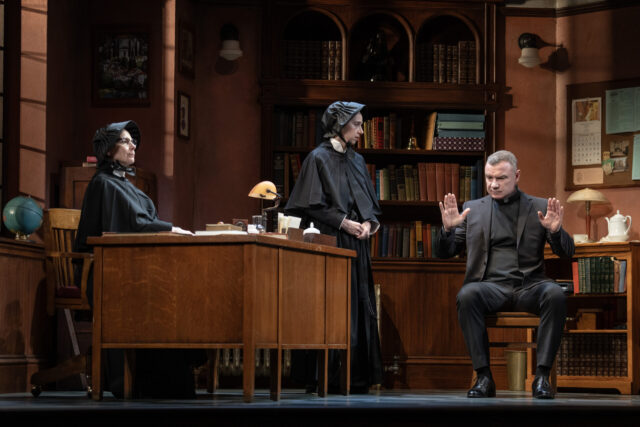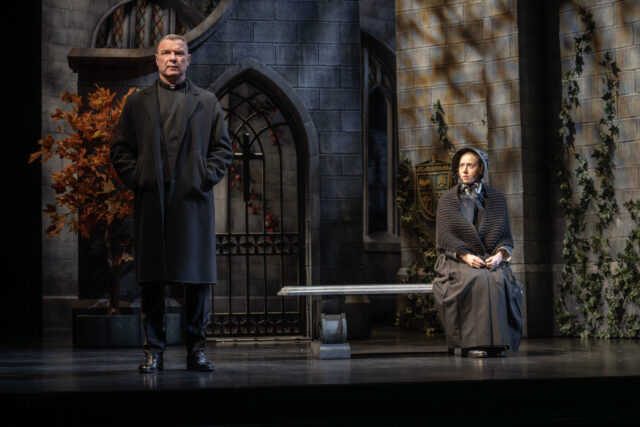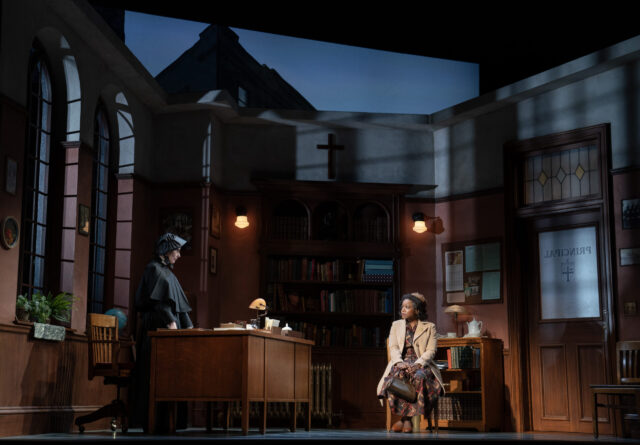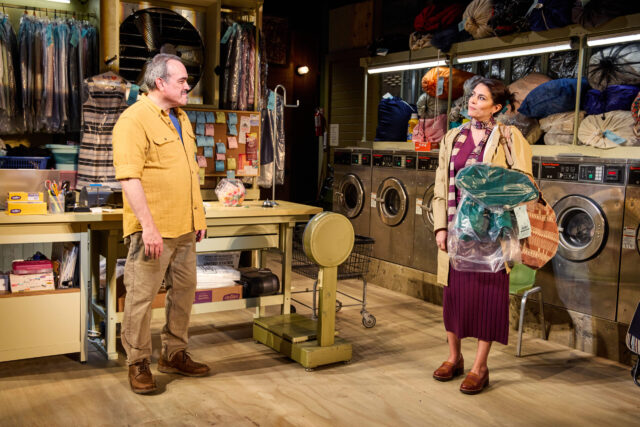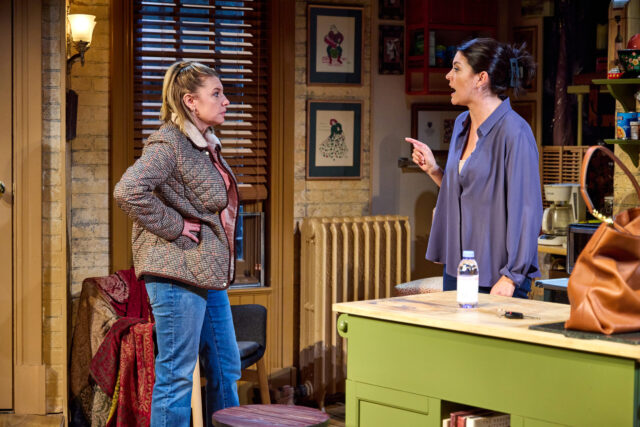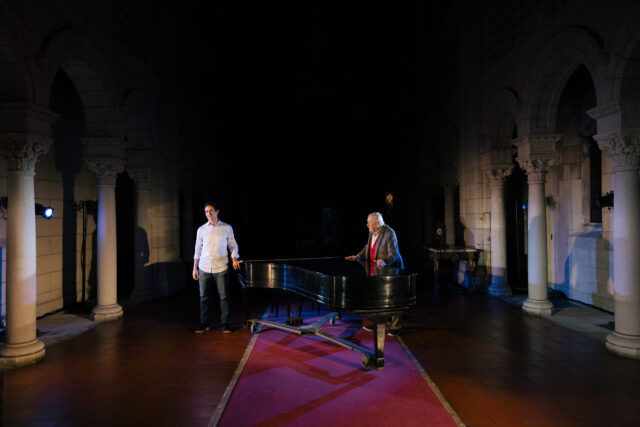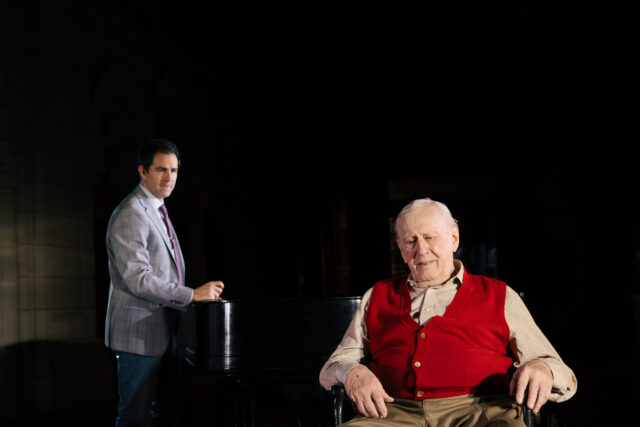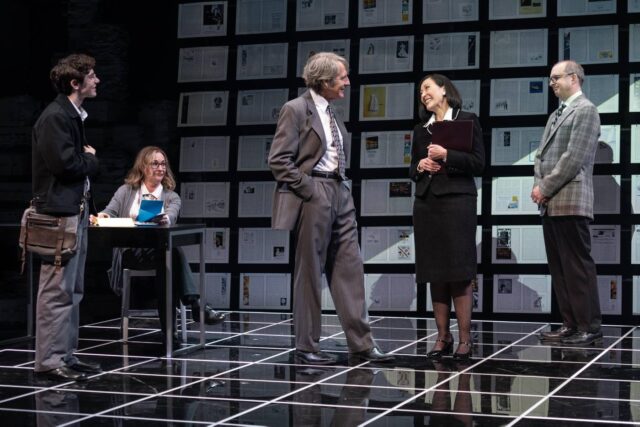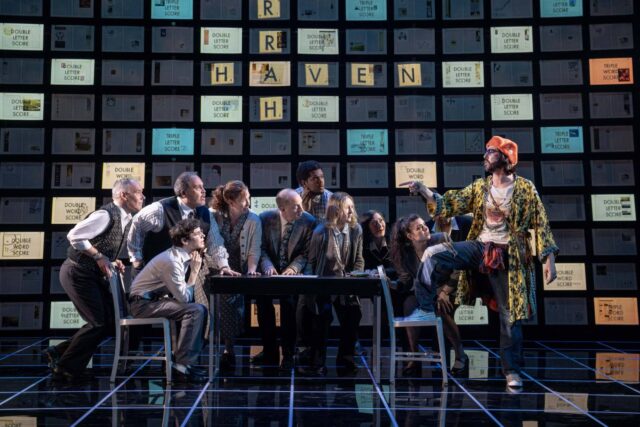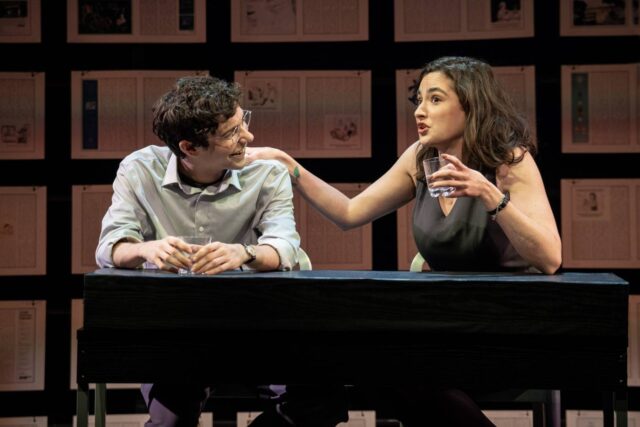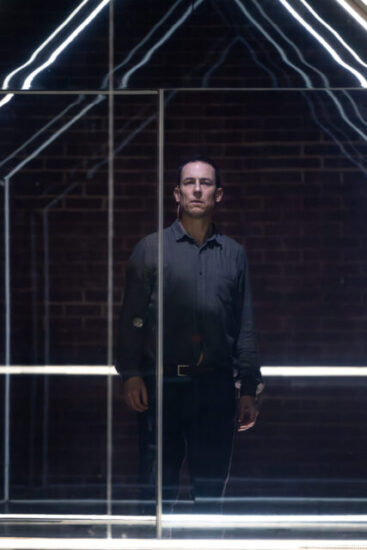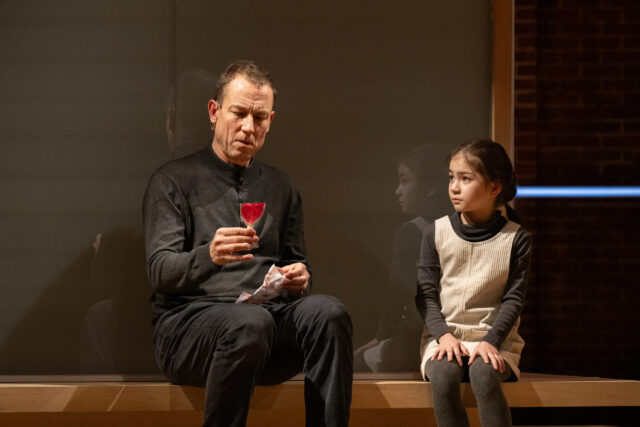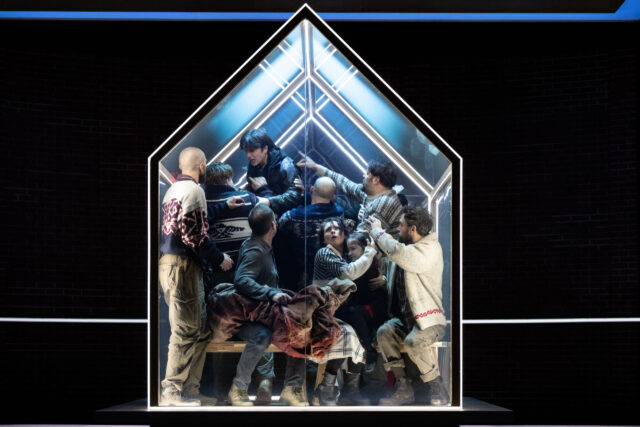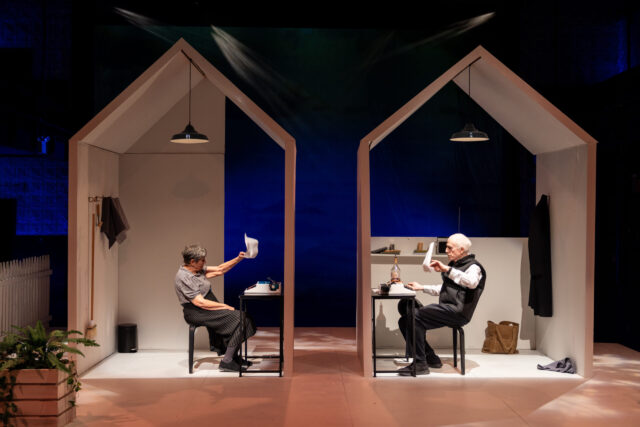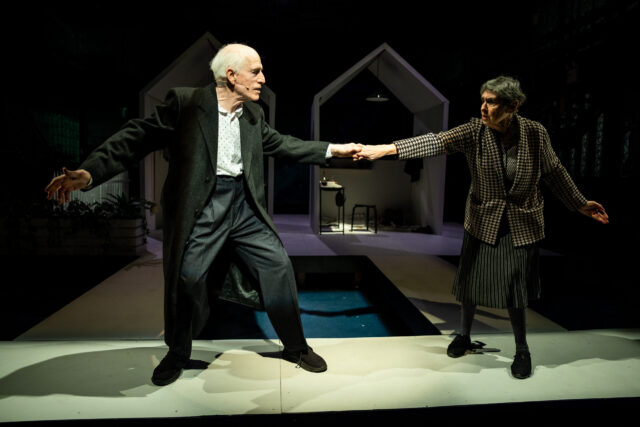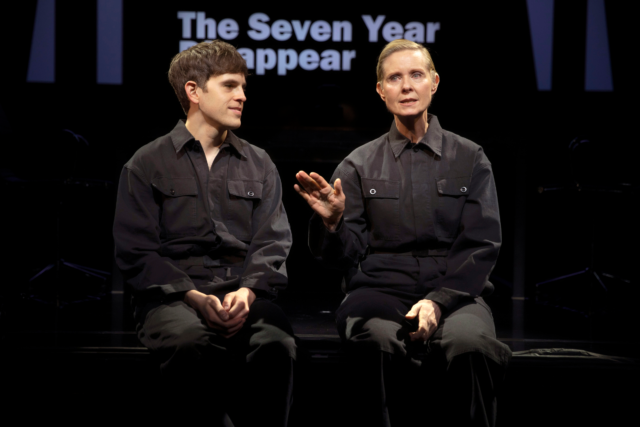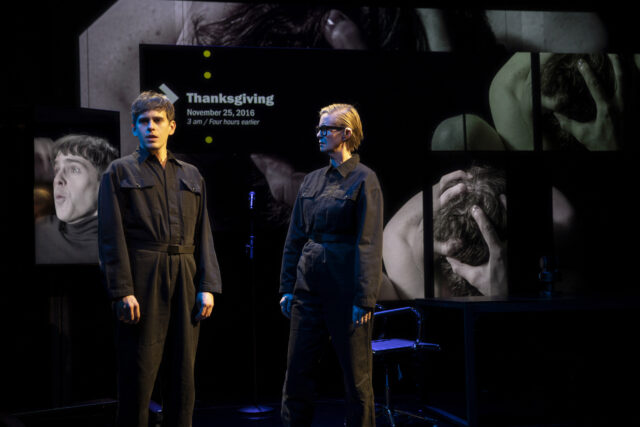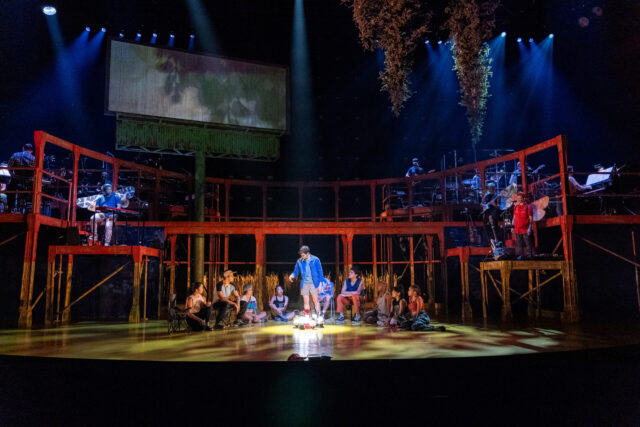
Illinoise reimagines Sufjan Stevens album as a dance-theater piece (photo by Stephanie Berger)
ILLINOISE
Park Avenue Armory, Wade Thompson Drill Hall
643 Park Ave. at 67th St.
Monday – Saturday through March 26, standby only
212-933-5812
www.armoryonpark.org
Justin Peck and Sufjan Stevens’s eighth collaboration is a poignant and exhilarating exploration of young love, grief, and the search for personal identity, with its fingers firmly on the pulse of today’s youth culture.
The DC-born Peck, thirty-six, is a Tony-winning dancer, choreographer, director, and filmmaker and the resident choreographer of New York City Ballet. The Detroit-born Stevens, forty-eight, is a Grammy- and Oscar-nominated singer-songwriter and soundtrack composer. The longtime friends have previously worked together on pieces for NYCB, Houston Ballet, Miami City Ballet, Joffrey Ballet, San Francisco Ballet, and Pacific Northwest Ballet, including Year of the Rabbit, Everywhere We Go, and Reflections.
Their latest, the dazzling Illinoise, opened Wednesday night for a sold-out run continuing in Park Ave. Armory’s massive Wade Thompson Drill Hall through March 26. [ed. note: The production is moving to Broadway, running April 24 to August 10 at the St. James.]
The ninety-minute dance-theater work is based on Stevens’s 2005 concept album, Illinois, aka Sufjan Stevens Invites You to: Come on Feel the Illinoise. “I feel like specifically Illinois and Chicago are sort of the center of gravity for the American Midwest,” Stevens told Dusted about the genesis of the record.
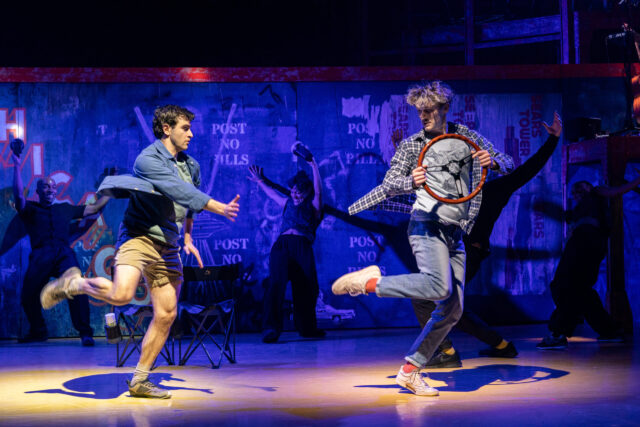
Henry (Ricky Ubeda) and Carl (Ben Cook) go on a road trip in Illinoise (photo by Stephanie Berger)
The original story, by Peck and Pulitzer Prize–winning playwright Jackie Sibblies Drury (Fairview, Marys Seacole), introduces us to a young man named Henry (Ricky Ubeda) as he ventures from a small town in the middle of nowhere, Illinois, to Chicago and then New York City. He joins up with a group of eleven free-living young people who are like a modern-day version of the hippies from Hair. Sitting around a campfire (consisting of lanterns), they take journals out of their backpacks and share stories from their lives.
The dancers never speak or sing; Adam Rigg’s multilevel wooden set features three small platforms for a trio of vocalists: keyboardist Elijah Lyons and guitarists Shara Nova and Tasha Viets-VanLear. They wear wasp sings, which refer to the song “The Predatory Wasp of the Palisades Is Out to Get Us!,” in which they sing, “Oh, I am not quite sleeping / Oh, I am fast in bed / There on the wall in the bedroom creeping / I see a wasp with her wings outstretched.” Eleven other instrumentalists, from drums, strings, woodwinds, and horns to bass, banjo, percussion, and mandolin, are scattered across the top level.
Morgan (Rachel Lockhart) looks for signs from the ancestors underneath a billboard of a canceled Andrew Jackson (“Jacksonville”). Jo Daviess (dance captain Jeanette Delgado) is surrounded by evil-masked figures in black robes representing the Founding Fathers (“They Are Night Zombies!! They Are Neighbors!! They Have Come Back from the Dead!! Ahhhh!”). Wayne (Alejandro Vargas) encounters serial killer John Wayne Gacy in a clown outfit, realizing that we all have secrets to hide (“John Wayne Gacy, Jr.”). And the aptly named Clark (Robbie Fairchild) removes his glasses and shirt and becomes Superman, one of many, believing, “Only a steel man came to recover / If he had run from gold, carry over / We celebrate our sense of each other / We have a lot to give one another” (“The Man of Metropolis Steals Our Hearts”). The costumes are by Reid Bartelme and Harriet Jung, with masks by Julian Crouch and props by Andrew Diaz.
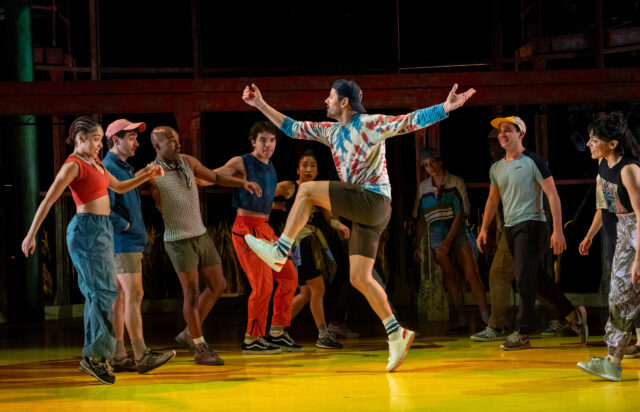
Clark (Robbie Fairchild) turns into Superman at Park Ave. Armory (photo by Stephanie Berger)
Those tales serve as a prologue to the main narrative, which Henry reluctantly conveys, involving a Jules and Jim–like relationship between him and his childhood friends Carl (Ben Cook) and Shelby (Gaby Diaz) and, later, his first adult love, Douglas (Ahmad Simmons). Jealousy, illness, and loyalty bring them together and tear them apart as they try to find their place in a difficult world — from politics to family to religion — that often doesn’t even try to understand them. “Tuesday night at the Bible study / We lift our hands and pray over your body / But nothing ever happens,” they sing in “Casimir Pulaski Day,” named for the Polish freedom fighter who was a general in the Continental Army and became known as the Father of American Cavalry.
Ultimately, in the finale, “The Tallest Man, the Broadest Shoulders,” they declare, “What have we become, America?”
Illinoise explodes with energy but is anchored by an underlying tenderness. Have no fear if you’re not a fan of Stevens; Nathan Koci’s music direction and supervision and Timo Andres’s arrangements and orchestrations lift the score, and some of Stevens’s more twee lyrics disappear into the overall thrilling zeitgeist.
Innate hope and charm emanate from the dancers, highlighted by Lockhart, Delgado, Vargas, Fairchild, and Byron Tittle, who portrays Estrella and adds tap to a movement language that blends contemporary and ballet. The four leads — Ubeda, Cook, Diaz, and Simmons — imbue their characters with deep emotional conflicts that can be as stirring as they are heartbreaking; several scenes play out like a twenty-first-century silent movie in color. The cast also features Christine Flores as Anikova, dance captain Craig Salstein as I-94 East Bound, and Kara Chan as Star, with Jada German, Zachary Gonder, Dario Natarelli, and Tyrone Reese making up the swing.
Not everything works, and the timeline can get confusing, but Peck and Sibblies Drury pull no punches. Garth MacAleavey’s sound design reverberates throughout the hall, while Brandon Stirling Baker’s lighting bursts forth in multiple palettes and cleverly informs us of the location, accompanied by projections on a billboard above the band.
Each attendee receives a program modeled on the journals used by the performers, in red, blue, orange, or green and with a different wasp wing image on it. Inside are several handwritten entries by Henry, complete with illustrations and even a blotch that Henry explains is a “tear mark b/c I made myself cry in my new journal like a dork.” He also writes, “I couldn’t feel anything. Maybe I couldn’t feel it because I am too obsessed with my own past.”
Illinoise will make you feel. And if you are so inclined, there are several blank pages at the back of the program where you can share and reflect.
[Mark Rifkin is a Brooklyn-born, Manhattan-based writer and editor; you can follow him on Substack here.]
